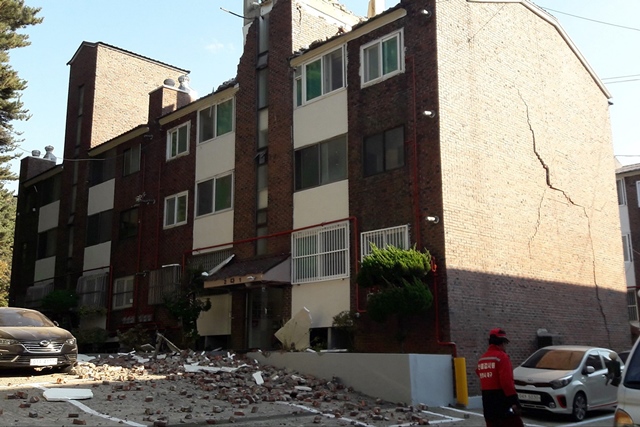
The quake, felt across much of the country including in the capital Seoul, struck at the shallow depth of nine kilometres (six miles) near the industrial city of Pohang at around 2:30 pm (0530 GMT), the Korea Meteorological Administration said.
Seven people were injured, Seoul's public administration ministry said, but they warned that number could rise because the quake was shallow.
The Korean peninsula rarely has to worry about significant quakes.
But seismic activity is closely monitored because a spike in activity is often the first indication that North Korea has carried out a nuclear test.
Iran hunts for survivors as quake kills 400 near Iraq border
The port city of Pohang is home to the headquarters of Posco -- the country's top, and the world's fourth largest, steelmaker. No immediate damage was reported in the firm's steel mills.
Photos and video footage sent to local TV stations showed crumbled street walls, furniture violently shaking inside people's homes and people rushing out of buildings in panic.
Shattered storefronts and goods tumbling off store shelves were seen in images posted on social media, as well as cars smashed by fallen bricks and cracks in the ground.
Iran's quake death toll rises to 530, more than 8,000 injured
Emergency centres nationwide were flooded with thousands of calls seeking information, while Kakao Talk -- the South's top mobile messenger application -- reported service disruption due to heavy traffic.
South Korean President Moon Jae-In, on his way to Seoul after attending the ASEAN summit in Manila, is set to hold an emergency meeting upon arrival, his office said.
Wednesday's quake was followed by multiple aftershocks including a 4.3-magnitude tremor that hit about two hours later.
It came a day ahead of the all-important college entrance exam during which the whole nation falls silent to help teenagers focus on the annual event, whose result could define their future in the competitive society.
As many fear more quakes that may take place on the crucial day, Prime Minister Lee Nak-Yeon ordered officials to deploy "all government resources possibly available" to ensure that Thursday's test is held smoothly.
Even Seoul's financial markets and many businesses open late on the day to clear traffic for test-takers, with airport landing and takeoffs suspended for 30 minutes during the main language listening test.
Local nuclear reactors were operating without disruption, Yonhap news agency said, citing officials at Korea Hydro and Nuclear Power.
The most powerful quake recorded in the South was a 5.8-magnitude tremor that hit the southeastern city of Gyeongju in September last year.

1722586547-0/Untitled-design-(73)1722586547-0-165x106.webp)


1732326457-0/prime-(1)1732326457-0-165x106.webp)




1731325890-0/trump-(24)1731325890-0-270x192.webp)







COMMENTS
Comments are moderated and generally will be posted if they are on-topic and not abusive.
For more information, please see our Comments FAQ